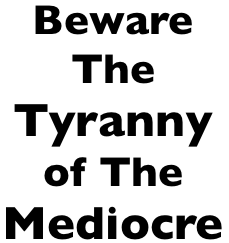

Spoon feed the masses images ... until they accept future
visions that the elite wish to tangibly enact. This process of gradual and subtle inculcation is called "
predictive programming".
And it's the reason why the average nerd walking around today fancies himself an "atheist". They think they don't believe in God, not realizing they've simply exchanged one god for another.

It's starts off as an innocent Star Wars "Trilogy", with cute little green puppets and muhfuggas praising "The Force".

Next thing you know little 12 year old Dilan is worshiping Satan and shooting up Columbine at 16.
According to Michael Hoffman, this type of Sci-Fi shit is instrumental in the
indoctrination of the masses into the doctrines of the elite: “Traditionally, 'science fiction' has appeared to most people as an adolescent genre, the province of time-wasting fantasies. This has been the great strength of this genre as a vehicle for the inculcation of the ideology favored by the Cryptocracy. As J.H. Towsen points out in Clowns, only when people think they are not buying something can the real sales pitch begin. While it is true that with the success of NASA's Gemini space program and the Apollo moon flights more serious attention and respectability was accorded 'science fiction,' nonetheless in its formative seeding time, from the late 19th century through the 1950s, the predictive program known as 'science fiction' had the advantage of being derided as the solitary vice of misfit juveniles and marginal adults.” (205)
“Traditionally, 'science fiction' has appeared to most people as an adolescent genre, the province of time-wasting fantasies. This has been the great strength of this genre as a vehicle for the inculcation of the ideology favored by the Cryptocracy. As J.H. Towsen points out in Clowns, only when people think they are not buying something can the real sales pitch begin. While it is true that with the success of NASA's Gemini space program and the Apollo moon flights more serious attention and respectability was accorded 'science fiction,' nonetheless in its formative seeding time, from the late 19th century through the 1950s, the predictive program known as 'science fiction' had the advantage of being derided as the solitary vice of misfit juveniles and marginal adults.” (205)

 Spoon feed the masses images ... until they accept future visions that the elite wish to tangibly enact. This process of gradual and subtle inculcation is called "predictive programming".
Spoon feed the masses images ... until they accept future visions that the elite wish to tangibly enact. This process of gradual and subtle inculcation is called "predictive programming". Next thing you know little 12 year old Dilan is worshiping Satan and shooting up Columbine at 16.
Next thing you know little 12 year old Dilan is worshiping Satan and shooting up Columbine at 16.













































































































16 comments:
Interesting.
On a personal note, I've always enjoyed science fiction novels. I've read hundreds of them since childhood.
True, the absence of God and futility of religion are a big theme in most of them, but not all. I actually prefer folks saying God doesn't exist so they can do what they want to those people who admit that God does exist, but still think they can do what they want.
DV say: "It's starts off as an innocent Star Wars "Trilogy", with cute little green puppets and muhfuggas praising "The Force".
Next thing you know little 12 year old Dilan is worshiping Satan and shooting up Columbine at 16."
That's a hell of a leap there man.
I actually think you're missing part of the picture when it comes to Star Wars.
A lot of the Star Wars movies had some legit political commentary and many sci-fi movies have lessons on the follies of Empire, and the police state.
You're always talking about the police state, so you should be able to get with this. This scene with Palpatine and the creation of the Galactic Empire is a straight up mirror image of Bush 43 and his Patriot Act (or Hitler and his Reich): How Liberty Dies
The Emperor: [to the Senate] In order to ensure our security and continuing stability, the Republic will be reorganized into the first Galactic Empire, for a safe and secure society.
[Senate fills with enormous applause]
Padmé: [to Bail Organa] So this is how liberty dies... with thunderous applause.
With thunderous applause.
Brother Gray!
Always a pleasure.
Don't get me wrong. There is tremendous literary value in sci-fi.
There is also a tremendous amount of symbolism.
I submit that that symbolism is not without rhyme nor without reason.
That symbolism was not born neither in the imaginations of George Lucas nor that of Harlan Ellison.
Phillip Collins collected these observations:
"In Orthodoxy and the Religion of the Future, Bishop Seraphim Rose expands on the role of sci-fi in the promulgation of evolutionary thought:
“The center of the science fiction universe (in place of the absent God) is man--not usually man as he is now, but man as he will 'become' in the future, in accordance with the modern mythology of evolution.” (73)
Reiterating Vernier's contention that the sci-fi notion of evolution is "a kind of mutation resulting in the confrontation of man with different species," Rose observes:
“Although the heroes of science fiction stories are usually recognizable humans, the story interest often centers about their encounters with various kinds of 'supermen' from 'highly-evolved' races of the future (or sometimes, the past), or from distant galaxies. The idea of the possibility of 'highly-evolved' intelligent life on other planets has become so much a part of the contemporary mentality that even respectable scientific (and semi-scientific) speculations assume it as a matter of course. Thus, one popular series of books (Erich von Daniken, Chariots of the Gods?, Gods From Outer Space) finds supposed evidence of the presence of 'extraterrestrial' beings or 'gods' in ancient history, who are supposedly responsible for the sudden appearance of intelligence in man, difficult to account for by the usual evolutionary theory.” (73)
According to Rose, science fiction's traditional depiction of religion suggests that the future will inherit a nebulous and indefinable spirituality:
“Religion, in the traditional sense, is absent, or else present in a very incidental or artificial way. The literary form itself is obviously a product of the 'post-Christian' age (evident already in the stories of Poe and Shelley). The science fiction universe is a totally secular one, although often with 'mystical' overtones of an occult or Eastern kind. 'God,' if mentioned at all, is a vague and impersonal power, not a personal being (for example, the 'Force' of Star Wars, a cosmic energy that has its evil as well as good side). The increasing fascination of contemporary man with science fiction themes is a direct reflection of the loss of traditional religious values.” (73)
Expanding on the "mystical" themes of sci-fi, researcher Carl Raschke asserts that the literary genre invariably extends itself into the realm of the occult:
“The snug relationship between occult fantasy and the actual practice of the occult is well established in history. Writers such as H.P. Lovecraft and Edgar Rice Burroughs, progenitor of the Tarzan and Jane tales, were practicing occultists.” (303)
And you say that to say what DV?
You acknowledge that sci-fi has literary value and political relevance to our world on the one hand, but then go on to suggest that there's something wrong with it due to the absence of a "personal God" on the other?
Then there's this:
"'God,' if mentioned at all, is a vague and impersonal power, not a personal being (for example, the 'Force' of Star Wars, a cosmic energy that has its evil as well as good side). The increasing fascination of contemporary man with science fiction themes is a direct reflection of the loss of traditional religious values.”
Say what?
I'm not too sure about this.
Have you ever researched the themes of Star Wars?
Do you know who Joseph Campbell is?
I delete stuff that makes me nervous.
"Denmark Scurred said...
I delete stuff that makes me nervous."
Actually Mike, I'm a little embarrassed for you.
You don't really want people to see that shit.
... you don't bra.
I'm looking out for Mike.
Yeah, that's the ticket!
"DV" I am not Denmark Compassionate or Denmark Scurred!
But you certainly seem bothered!
^That "Michael Fisher" is not me. Though I'm not going to disagree with what the person said.
^^ "Michael Fisher" arguing with himself and agreeing with himself all in the same post.
Negro don't even remember who he really is.
Well, why don't you publish that IP address you claim to have, then.
But all these future worlds without God are more dystopian than they are utopian.
They are not really saying anything good about a world without God.
I didn't catch a single valid reference to a specific godless, fictional, future world.
I think Gray pegged it right when he pointed out the vacuousness of this and the related post that this one spawned.
Perhaps Levar, you can provide us with the corresponding valid reference to a specific godful, future world.
Certainly Beelzebub,
I'll give you a pair of my personal favorite godful canons of fictional futurism.
Robert Anton Wilson's and Philip K. Dicks.
and of course, there's the book I use to kickstart not only my children's interest in the genre, but in reading for personal pleasure in general.
Post a Comment